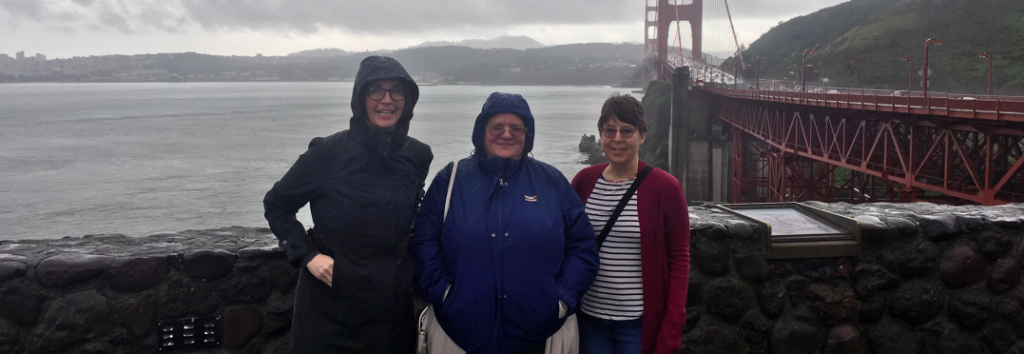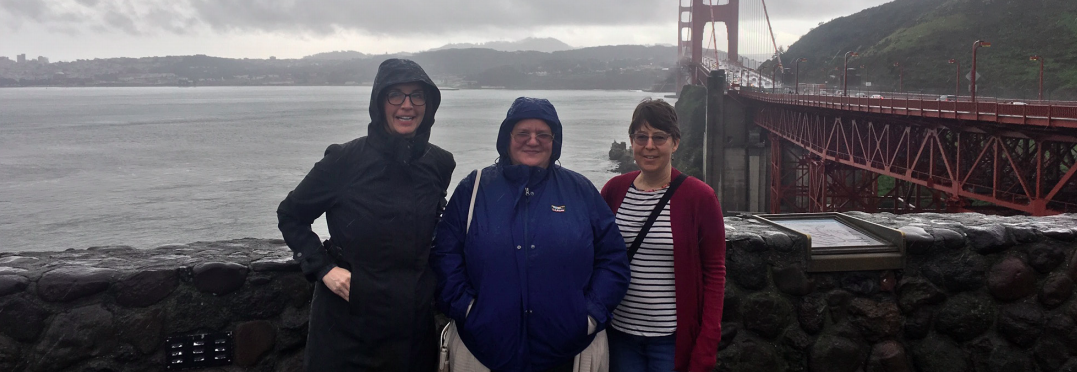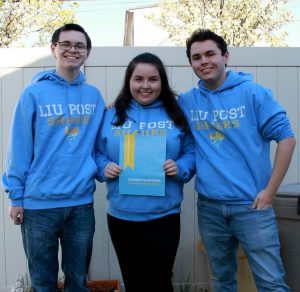Last updated on Mar 25, 2019
By Anand Venigalla
Features Editor
The core curriculum and peer mentor program were recognized by the American Association of Colleges and Universities (AACU),the leading national organization dedicated to advancing the standing of liberal education, at the conference “Creating a 21st-Century General Education: Responding to Seismic Shifts,” on Feb. 14-16 in San Francisco.

Fr. left: Dr. Abby van Vlerah, Michele Dornisch, and Nancy Frye in San Fransisco
Dr. John Lutz, chairperson of the English, philosophy, and foreign languages department, Dr. Margaret Boorstein, professor of geography and the chairperson of the earth and environmental sciences department, and Dr. Abby van Vlerah, the former dean of students, presented their panel “Pathways to the Majors: Fostering Interdisciplinary Collaboration Between Liberal Arts and Sciences and Professional Schools” at the conference.
“We explained to them how we had meetings throughout the summer, open to any faculty members, and from that we developed ideas about how our core should be structured, so this was cooperation and collaboration, which
are usually good things to do,” Boorstein said.
Lutz, Dr. Nancy Frye, professor of psychology and the graduate director of the psychology department, and Dr. Michele Dornisch, associate professor of education, also presented a panel on the peer mentor program called
“Mentoring Matters: Feelings of Belonging and Self-Efficacy in First-Year Students with and without Peer Mentors.”
“The overall idea is that we want to create opportunities for students in all areas to take courses that are related to their areas of interest and at the same time provide them with the basic skills and wisdom that is found in the liberal arts and sciences,” Lutz said.
Their presentations went through a review process before being chosen for the meeting. “We presented what the faculty at Post created. And before we presented it, we had to write up an abstract and explain how we’re going to
explain this to our audience,” Boorstein said.
“And we chose to do a workshop and so it was received by AACU and they decided that our workshop was good enough to be presented at
their meeting.”
Lutz finds that the core curriculum and the peer mentor program at Post respond to a major shift in the perception of the value of liberal education.
“I think in the 20th century, you could make the better argument for the
importance of the liberal arts, but it’s being challenged in some areas.” he said.
Lutz wanted the AACU workshop audience to recognize the value of collaboration when constructing curricula. “My hope is that even
the larger benefits to this campus is that collaboration has lasting benefits, that different divisions and units are able to work together to advance this new curriculum and also hopefully the other aspects like the peer mentor program also develop as well.”
Frye’s findings about first year course Post 101 indicated that the presence of peer mentors increased a sense of connection between students. “One of the goals of changing the core was to make the core courses more relevant to students and make them feel like they’re more active learners,” Frye said.
Frye sees the peer mentor program as an innovative force in education and on campus.
“I think at Post and education in general, we’re working to have students see the connections between what they’re learning in the classroom and other aspects of their lives,” she said.
The reception at the conference for the Post findings was positive, Frye said. Though the main focus of the peer mentor program is in Post Foundations, she would find it interesting to see how peer mentorship could be applied to other classes.



Be First to Comment